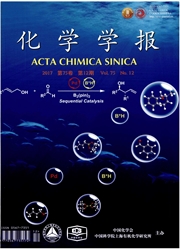

 中文摘要:
中文摘要:
研究了用芹菜茎薄片在温和与环境友好的条件下催化芳香酮的对映选择性还原反应,制备得到具有光学活性的(S)-1-芳基醇,产物的对映选择性符合Prelog规则.考察了pH值、反应时间、反应温度、底物浓度等因素对底物芳香酮的转化率和产物(S)-1-芳基醇的对映体过量值的影响,并优化了这些反应条件.文中还研究了底物的构效关系,发现羰基两边取代基的空间效应和电子效应明显影响底物的转化率和产物的对映体过量值.在合适的条件下底物苯乙酮的转化率高达100%,产物(S)-1-苯基乙醇的对映体过量值大于99.0%.苯丙酮、对甲基苯乙酮和对氯苯乙酮等其它芳香酮的转化率达到中等程度,但所得(S)-1-芳基醇的最大对映体过量值均大于99.0%.
 英文摘要:
英文摘要:
The enantioselective reduction of aromatic ketones was investigated by using celeriac chips as biocatalysts under mild and environmentally benign conditions, which afforded corresponding optically active (S)-1-aryl alcohols. The enantioselectivity of products was in accordance with the Prelog's rule. The effects of some factors, including pH, reaction time, reaction temperature, substrate concentration, on the conversion of aromatic ketones and the enantiomeric excesses of (S)-1-aryl alcohols were examined, and these reaction conditions were optimized. The structure-effect relationship of substrates was also studied. The steric factors and electronic effects of substituents linked to carbonyl group have been found to significantly affect the conversion of substrates and the enantiomeric excesses of products. Under appropriate conditions, the conversion of acetophenone could be as high as 100% and the enantiomeric excess of (S)- 1-phenylethanol exceeded 99.0%. The conversion of other aromatic ketones, including propiophenone, p-methylacetophenone and p-chloroacetophenone, reached moderate level, but all of the highest enantiomeric excesses of corresponding (S)-1-aryl alcohols exceeded 99.0%
 同期刊论文项目
同期刊论文项目
 同项目期刊论文
同项目期刊论文
 Discovery and Utilization of Biocatalysts for Chiral Synthesis: An Overview of Chinese Scientists Re
Discovery and Utilization of Biocatalysts for Chiral Synthesis: An Overview of Chinese Scientists Re Environmentally benign synthesis of natural glycosides using apple seed meal as green and robust bio
Environmentally benign synthesis of natural glycosides using apple seed meal as green and robust bio Assembly of a three-dimensional array of glycoconjugates by combinatorial biocatalysis in nonaqueous
Assembly of a three-dimensional array of glycoconjugates by combinatorial biocatalysis in nonaqueous Isolation of Rhodococcus sp Strain ECU0066, a New Sulfide Monooxygenase-Producing Strain for Asymmet
Isolation of Rhodococcus sp Strain ECU0066, a New Sulfide Monooxygenase-Producing Strain for Asymmet Adzuki bean: A new resource of biocatalyst for asymmetric reduction of aromatic ketones with high st
Adzuki bean: A new resource of biocatalyst for asymmetric reduction of aromatic ketones with high st Enzymatic Production of l-Menthol by a High Substrate Concentration Tolerable Esterase from Newly Is
Enzymatic Production of l-Menthol by a High Substrate Concentration Tolerable Esterase from Newly Is Biocatalytic synthesis of (R)-(-)-mandelic acid from racemic mandelonitrile by a newly isolated nitr
Biocatalytic synthesis of (R)-(-)-mandelic acid from racemic mandelonitrile by a newly isolated nitr 期刊信息
期刊信息
